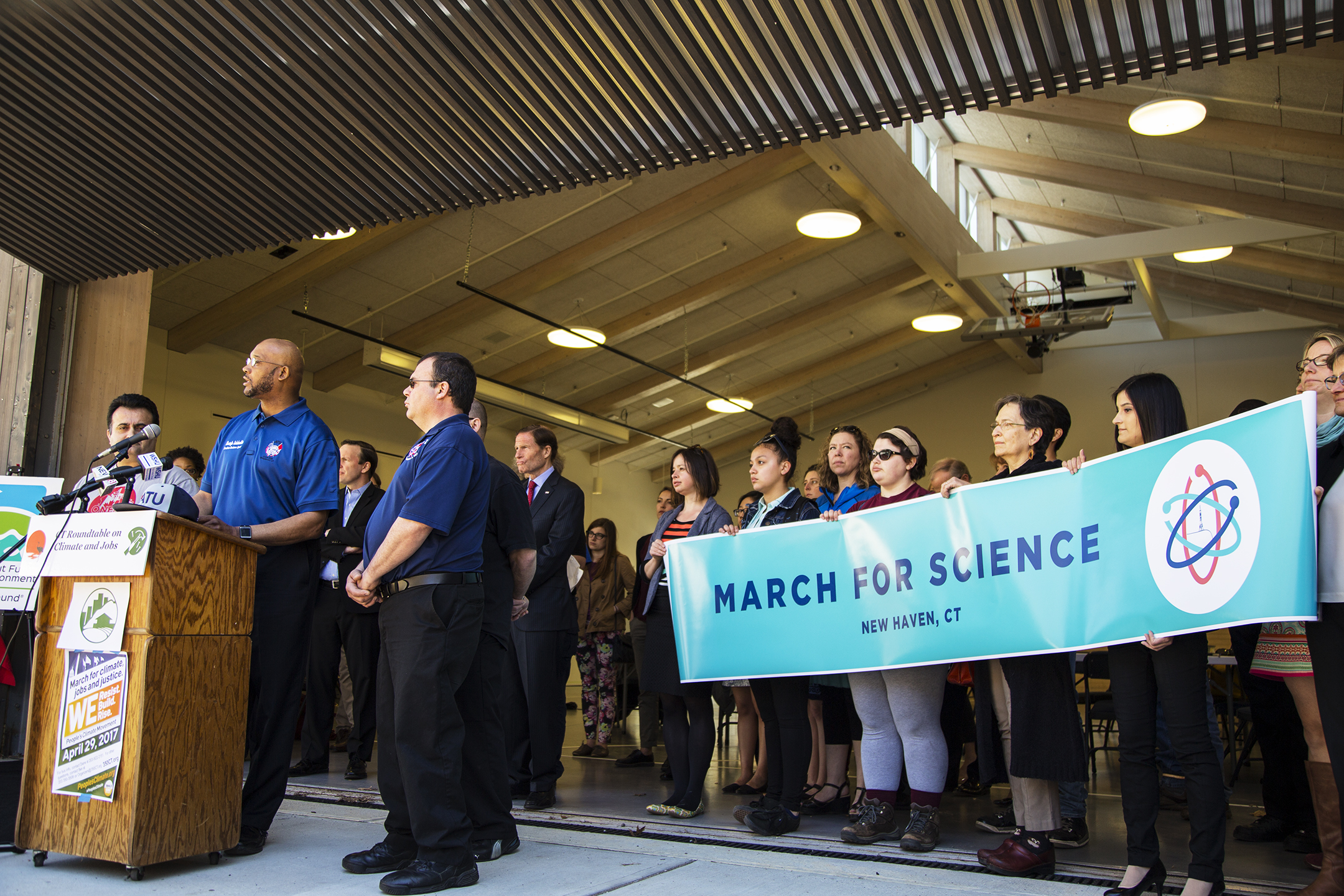
New Haven will join more than 500 cities around the world this Saturday in the March for Science, a global movement that will celebrate and defend the integral role played by science in health, environment and government.
Inspired by the Women’s March on Washington, the national March for Science campaign was organized shortly after the Nov. 8 presidential election in response to the anti-science rhetoric from President Donald Trump’s campaign. While the largest march will take place in Washington, D.C., local activists have also organized 517 satellite marches in all 50 states plus 52 countries around the globe, as of Wednesday night.
The New Haven event, to be held at College Woods in East Rock Park, will begin at 1 p.m. on Saturday with a fair that will allow community members to interact with science demonstrations, as well as a “story corner” for scientists to share their personal experiences, according to the New Haven March’s website. The march, which will start at 3 p.m., will be preceded by a rally at 2 p.m. featuring speakers from Yale and the broader state.
“[The march] has an important role in communicating to our legislators how important supporting science is, whether it be promoting scientific teaching and research, or implementing data-driven policies,” said Katerina Politi, a professor at the Yale School of Medicine involved in the march’s organization. “It’s about letting our legislators know this is a really important issue and we can’t let it fall by the wayside.”
Several members of the Yale community spearheaded the New Haven march, including professors, research scientists and graduate students. The group came together at a regular meeting of the New Haven branch of Action Together Connecticut, a local activist coalition that formed after the presidential election.
After realizing that many members of Action Together Connecticut could not travel to D.C. for the main march, the group took interest in participating in the New Haven march, according to Becky Carlyle, an associate research scientist at the Medical School.
“[America has], at the moment, the top research community in the world, and an enormous amount of that is right here in New Haven,” Carlyle said. “If [the Trump administration] cuts science funding to the level they’re suggesting, that cripples our ability to respond to emergency situations. We will face climate change, disease pandemics, an aging population — we can’t deal with any of those without strong science.”
Medical school professor Diane Krause emphasized the importance of recognizing that although science does not have to be a partisan issue, it should play a role in informing policy decisions. She said that one of the most troublesome problems in the current political climate is the lack of respect for evidence-based and fact-based decision making.
Yale students have also been involved in this activism. Tianjiao Su GRD ’22 said she has been promoting a poster-making session with Women in Science at Yale and the Yale Science Diplomats in preparation for the event. Su added that she is also helping to recruit volunteers for the New Haven march.
Laura Grabel, a professor of science and society at Wesleyan University who will speak at the New Haven march, characterized the current administration as comfortable with ignoring data and reason in its policy-making. She added that defeating anti-science government officials should be a priority for scientists.
Dean of the School of Forestry & Environmental Studies Indy Burke, who will also speak at the event, said that while she dislikes portraying science as a political issue, the lack of science background within the Trump administration has politicized the industry.
Daniel Colón-Ramos, a professor of cell biology and neuroscience at the Yale School of Medicine, echoed Burke’s sentiment, noting that participating in the march was his duty as a scientist.
“In science, the word ‘political’ has negative connotations because it is associated with ‘bias,’” he said. “I am showing up to this march as a scientist and a citizen, to be accountable to my community by explaining what I work on and its importance to society.”
Other speakers include Richard Therrien, the K-12 science supervisor for New Haven Public Schools, U.S. Sen. Richard Blumenthal LAW ’73, D–Conn., State Representative Lonnie Reed and State Department of Energy and Environmental Protection Commissioner Robert Klee LAW ’04 GRD ’05.
Professor of Molecular, Cellular and Developmental Biology Valerie Horsley, a leader within Action Together Connecticut, said America is at risk of losing its next generation of scientists due to proposed federal spending cuts on research. She added that she hopes this march will emphasize that scientists are “real people” and that science is fun through the use of science stories and experiments along the march route.
“I am quite sure that all of our students care deeply about the role of science in informing environmental solutions, and I’ve encouraged via email all of our faculty, students and staff to participate and show their support,” Burke said. “It has been a strange time to be in higher education running a school of forestry and environmental studies because all the of the things we value that drive us to be a part of a school like this are under threat right now.”
The march will take place on Earth Day, which marks the anniversary of the birth of the environmental movement in 1970.







